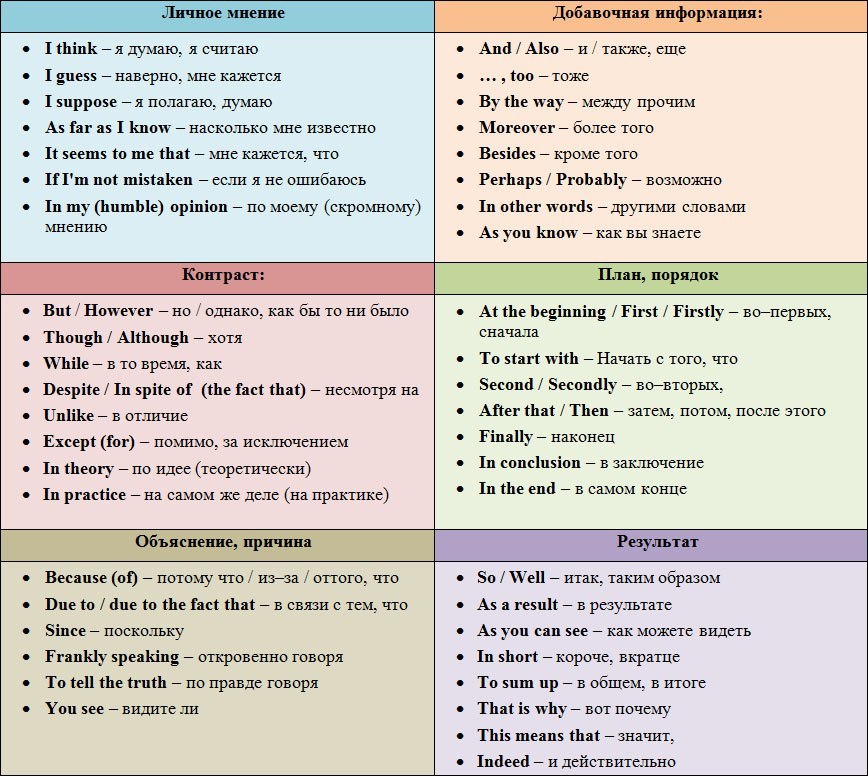Spoken English Leaning Video Spoken English Tutorial English Conversation
Совершенствуем разговорный английский
-
EFL Conversations – более 1500 диалогов на различные темы (диалоги сопровождаются аудиозаписями).
Don't forget about the linkers!

Давайте разнообразить свою английскую речь!
Те прилагательные, которые мы обычно усиливаем при помощи very, можно легко заменить на синонимы:
Very little (маленький) — Tiny (крошечный)
Very tasty (вкусный) — Delicious (восхитительный)
Very angry (злой) — Furious (разъяренный)
Very afraid (напуганный) — Terrified (напуганный до смерти)
Very tired (уставший) — Exhausted (изнеможённый)
Very hot (горячий, жаркий) — Boiling (кипящий)
Very hungry (голодный) — Starving (умирающий от голода)
Very big (большой) — Enormous (огромный)
Very cold (холодный) — Freezing (ледяной)
Very dirty (грязный) — Filthy (мерзкий)
Very good (хороший) — Great (замечательный)
Very bad (плохой) — Awful (ужасный)
Very nasty (мерзкий) — Dreadful (отвратительный)
Very important (важный) — Essential (существенный)
Very unusual (необычный) — Extraordinary (странный)
Very cheerful (радостный) — Hilarious (жизнерадостный)
Very expensive (дорогой) — Priceless (бесценный)
Very funny (смешной) — Ridiculous (смехотворный)
Например, вместо “It was a very good film!” можно сказать “It was a great film”.
Наречие very далеко не единственное в использовании с прилагательными. Вы можете сказать не только «очень жарко», но и «довольно жарко» — “rather hot”, «немного уставший» — “a bit tired”, «чрезвычайно важный» – “extremely important”. Вот типичные «усилители»:
Very (очень)
Rather (довольно)
Reasonably (разумно)
Extremely (чрезвычайно)
Dreadfully (ужасно)
Hugely (весьма)
Immensely (безмерно)
Intensely (интенсивно)
Slightly (слегка)
A bit (немного)
Но прилагательные можно «усилить» ещё больше при помощи следующих наречий:
Absolutely (абсолютно)
Completely (полностью)
Entirely (целиком)
Perfectly (совершенно)
Practically (практически)
Simply (просто)
Totally (полностью)
Utterly (крайне)
Virtually (поистине)
Almost (почти)
Exclusively (исключительно)
Fully (вполне)
Largely (в значительной степени)
Mainly (большей частью)
Nearly (приблизительно)
Primarily (первоначально)
Примеры:
Wasting money is simply ridiculous! – Тратить деньги попусту – это просто смешно!
The boss gave us a practically impossible task. – Начальник дал нам практически невероятное задание.
I was totally exhausted just after I cleaned a two stored building. – Я был полностью изнеможен сразу после того как убрал двухэтажный дом.
You shouldn’t have bought that dress. It was almost priceless. – Тебе не следовало покупать это платье. Оно почти бесценно.
The previous winter was virtually freezing. – Предыдущая зима была поистине морозной.
The Sun in every solitude desert is utterly boiling. – Солнце в любой безлюдной пустыне крайне палящее.
How to Build Your Spoken English Confidence?
Speak with Confidence - English Lesson to speak fluently
Do you still feel nervous about speaking English to others even though you’ve spent a long time studying English? Don’t worry, you are not alone. There are many people like you.
Confidence is a State of Mind. Positive Thinking, Practice, Training, Knowledge and talking to other people are all useful ways to help improve or boost your Confidence levels.The more You Practice the more you gain confidence. Confidence is needed to speak a new language.
Speaking a foreign language can be really intimidating. You know that you're probably making mistakes. You're worried that you might say something offensive and make people angry. It's stressful!
It's hard to make yourself speak when you don't feel confident, but to get better at speaking English, you have to practice. So where do you start? How can you become more confident with speaking English?
1. Fake it 'till you make it!
There's a saying in English, "Fake it 'till you make it." It means to pretend to be good at something, and pretend to feel confident. As you continue and build your skill, your fake confidence will be replaced by real confidence.
When you get a chance to speak to people in English, take it! Stand up straight and tall. Jump into the conversation and speak as if you're completely fluent.
2. Realize that your mistakes don't matter.
When I was a teenager, I used to think that everyone at school was looking at me and judging what I looked like, what I wore, and how I acted. As I got older, I realized that no one really cared what I did; they were too busy worrying about themselves.
That's true of your English skill, too. The people you're speaking with probably don't care whether your grammar is good or bad. They have their own problems to worry about.
Not only that, but English speakers are already used to understanding foreign accents. Most English-speaking countries have a lot of residents who were born in different countries. So native English speakers have a lot of experience with speaking to people with different accents. They may not even think about the fact that your English isn't perfect.
3. Take it easy.
Just because you're speaking to someone in English doesn't mean that you have to try out every word and every grammatical structure you know.
When you're in a conversation, your first job is just to listen to the other person. If you're listening carefully, you won't have time to worry about your own language problems.
Your next job is to respond to what other people are saying. Your response can be a smile or frown, a few simple words, or a short question. It doesn't have to be complicated.
Don't feel like you have to express every idea that you have in English. Some of your ideas might be too complicated for you to talk about right now. It's OK to save them for later and say something a little simpler instead.
4. Prepare.
In the end, the best way to feel confident is to become a better English speaker. Certain kinds of practice can be really helpful for boosting your confidence:
Practicing speaking will make you a better speaker. Even if you speak by yourself, you're training the muscles of your mouth and throat to produce English sounds.
Reviewing things that you've learned in the past, rather than trying to learn new things, can make you feel more sure about what you're saying.
If you know that you're going to talk about a specific topic, learning specific vocabulary for that topic will make you feel a lot more prepared. For example, if you're going to a job interview, make sure that you know how to describe your education background and job history. (From site:learnonlineenglishspeaking)
In this spoken English Video tutorial you will learn How to speak english fluently and Confidently.
-
3 tips for sounding like a native speaker - Speaking Exercises To Improve Your English
We will here learn 3 tips for sounding like a native speaker as well as How to understand what you hear like a native speaker, hopefully.
In addition to this, We will learn How to speak some of the common word to improve our pronunciation.
It will take time and a lot, a lot, a lot of practice. These three tips we tell you here will help you sound a little bit more like a native speaker.
Let's practice :-
So for example: we do not say: "black coffee", we don't say: "ke, ke". There's only one "k": "bla coffee", "bla coffee." Another example We say: "Oh, not-at-all.", "Not-at-all.", "Not-at-all." Right? The "t", so this becomes: "No-ta-tall", "No-ta-tall", "Not at all".
We say "Interesting" but the true pronunciation is "In-chre-sting".
Here you will get to know 3 tips for sounding like a native speaker. And we will practice some Exercise to improve our English.
Smart and Polite ways to say 'NO' in English
Have you ever asked somebody to do you a favor? Or someone has asked you for help?
For example, If someone ask for Help or request you to come with them. So what will you do if you don't want to go with them? If a Neighbor asks you to help to move his Furniture and you are very busy. So what will you do in that situation? If you are offered a job but you are not Happy with it so you want to deny it. How would you say No in that situation? Many times people invite you for a party, a movie or a match and you don't want to go. How would you deny their invitation in that situation?
Have a look at some Smart and Polite ways to say 'No' or to deny something.
Learn POLITE expressions in English – Don't be RUDE!
Does your coworker have "a bun in the oven"? Has your boss "let himself go"? In this lesson, you will learn some expressions that people often use to say things indirectly in order to sound more polite or less rude. What can you do to avoid using words like "toilet", "dead", or "fat"? Watch this video to learn some interesting alternatives to these words and more.

